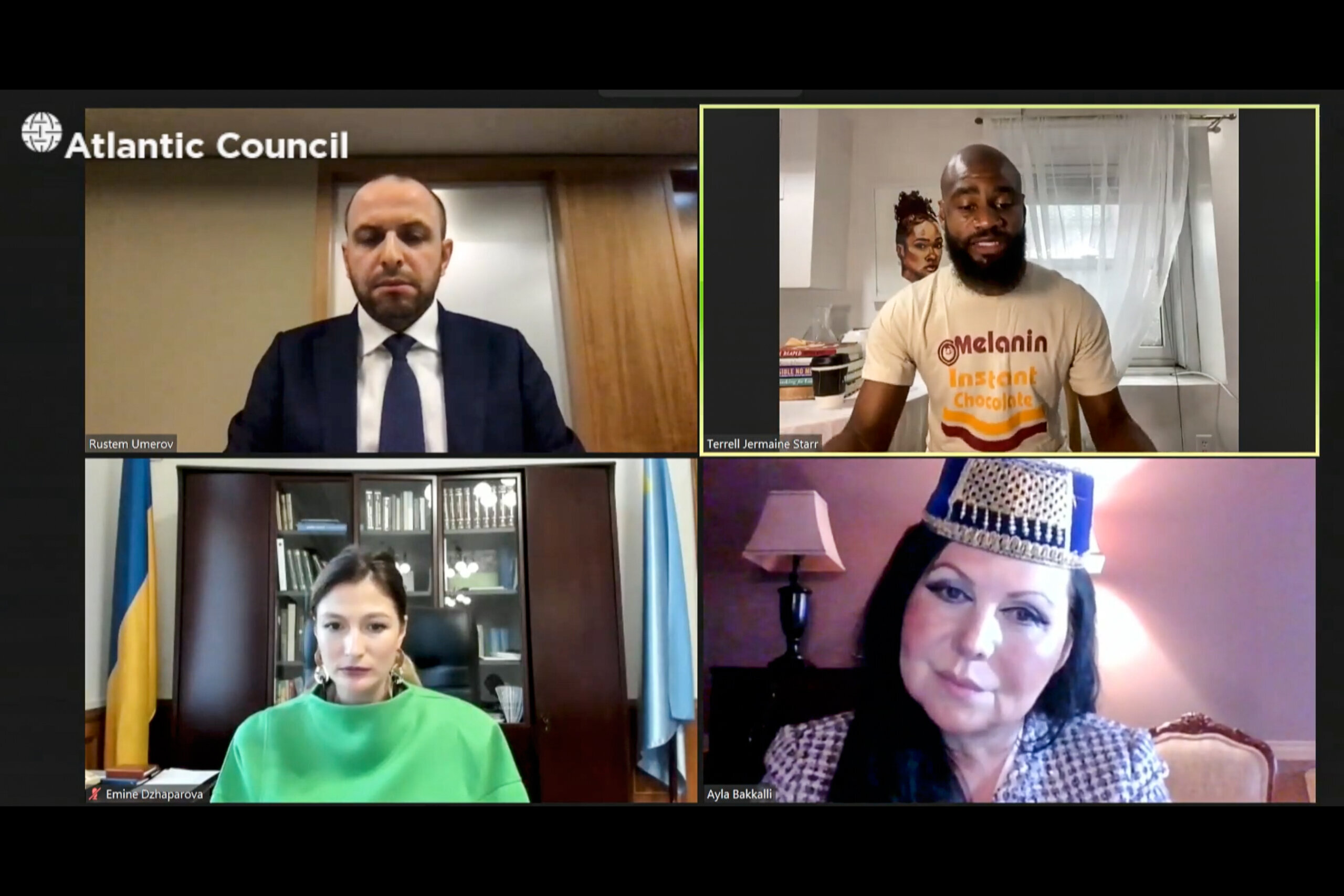It’s like a generational curse. Young Crimean Tatars are reliving the tragic history of their grandparents: regime change, occupation and displacement.
That was the message from several representatives of the Crimean Tatars, who joined a webinar hosted by the Atlantic Council and moderated by Terrell Jermaine Starr, a journalist and fellow at the think tank, on Oct. 20 to discuss efforts to help their community.
Crimea has been a land under dispute for more than two centuries, ever since the Russian Empire annexed the territory in 1783 under Catherine the Great.
Then, in 1944, amidst World War II, Soviet dictator Josef Stalin deported the entire indigenous Crimean Tatar population to Central Asia and Siberia after accusing them of collaborating with Nazi Germany.
However, with the beginning of the Soviet collapse in the late 1980s, many Crimean Tatars were finally able to return to their homeland. But they never could have imagined that their history would repeat itself in 2014, when Russia invaded and annexed Crimea.
The Ukrainian government does not recognize Moscow’s control over Crimea, and it is trying to help the 2.5 million Ukrainians stuck in the occupied region, including the most oppressed group, the Tatars.
“Publicity is the only instrument that saves and protects people,” said Emine Dzhaparova, an ethnic Crimean Tatar and Ukraine’s first deputy minister of foreign affairs. Dzhaparova is trying to raise awareness and show the international community the oppression that Ukrainians and Tatars are facing in Crimea.
“If it hadn’t been for the solid stance of the international community, we wouldn’t just have 130 political prisoners in Crimea, but thousands of them. If you dare to say Crimea is Ukraine (in the occupied peninsula), then you will be put in prison for at least five years,” she said.
In order to increase international outreach, Dzhaparova said a new international platform is currently being created. Called the Ukrainian Planet, the initiative will hold events on issues like non-recognition of Russia’s annexation, sanctions against Russia and diplomatic issues related to Crimea. The initiative will launch in 2021.

Panelists talk during “How Crimea’s Tatars are fighting occupation and displacement,” an online panel by the Atlantic Council. They are (clockwise from upper left) Ukrainian lawmaker Rustam Umerov, moderator Terrell Jermaine Starr, U.S. Crimean Tatar activist Ayla Bakkalli and Ukrainian Deputy Foreign Minister Emine Dzhaparova. (Courtesy)
The Crimean Tatars currently identify as the indigenous people of Crimea. Tatar representatives and non-governmental organizations have taken an active part in the United Nations permanent forum on indigenous issues.
“This is a (way) to communicate the issues from the ground roots on multiple platforms, to make the case known that Russia is the occupier of the Crimean peninsula of Ukraine,” said Ayla Bakkalli, a U.S. representative and executive member of the World Congress of Crimean Tatars and a representative of the Crimean Tatars at the United Nations.
Bakkalli further explained that Crimean Tatars have never accepted the illegal annexation.
“The Crimean Tatars are currently living in a time zone in which their past has become their present… a child who was born between 1991 and 2014 is experiencing a similar history of persecution as his grandparent who was also born in Crimea, but prior to the 1944 deportation,” Bakkalli said.
Ukrainians and Crimean Tatars have the same nemesis, according to her. “Ukrainian people empathize (with us) and the Ukrainian government understands that the most important currency is dignity and honor,” she said.
As a result of the Kremlin occupation, many Crimean Tatars have been left displaced. According to Rustem Umerov, a Crimean Tatar member of Ukraine’s parliament, 60,000 people have immigrated from Crimea to Ukraine’s mainland.
“We initiated several programs, (such as) the housing project, thanks to the Turkish Republic for supporting it and building a thousand-apartment construction for internally displaced people,” Umerov said.
Ukraine is also opening up cultural and educational centers for Crimean Tatars to preserve their cultural and religious identity.
“I’ve been to all of the negotiations since 2014,” Umerov said, “and if there is no blood spilled now in Crimea, it is because of the Crimean Tatar leadership, who have asked Ukrainian, European, Turkish and U.S authorities not to start a war, but unfortunately had to (accept) being occupied.”
